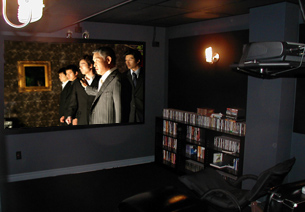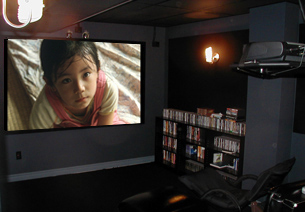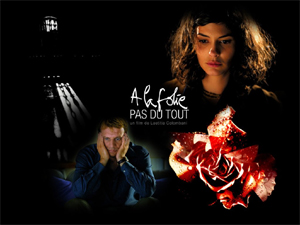KBT Presents: A BITTERSWEET LIFE

Ji-woon Kim is one of the three master filmmakers in Korea who blend a trademark artistry into their films which elevate them far above the standard genres with which they often flirt. (For the record, the other two are Chan-wook Park and Ki-duk Kim.) His previous horror film, A Tale of Two Sisters, is, for my money, the best of the J-Horror styled Asian horror films and I screened it at an earlier KBT showing. With A Bittersweet Life, Kim is firmly placing his film in the Gangster genre, but giving it subtextual layers which allow it to transcend.
Byung-hun Lee plays Sun-Woo, the #2 man in a prominent gangster operation. He is a smooth operator who stops to enjoy a succulently prepared desert prior to forcefully handling a group of troublemakers from a rival gang. His boss entrusts him to carry out nearly any task related to the business and he spends most of his time running a very upscale Hotel with a sky-lounge not accidentally called "La Dolce Vita". He is remote and has no life, girlfriend, or relations outside the business and is distant from both his boss and his fellow triad members. One day, his boss entrusts him to look after a mistress who could possibly be seeing someone off to the side. The orders are to watch her, and if she is having sex with someone else, eliminate both her and the lover. As Sun-Woo trails and interacts with the mistress, a beautiful and gentle woman which is so far out of his existence, he can barely have a mundane conversation with her, he doesn't so much as fall in love with her, as see how much 'life' he has sacrificed to be at his current status. When he does catch her with her boyfriend nearly in the act, Sun-Woo makes an interesting choice which puts him down the path of cleansing his soul.
A Bittersweet Life is not an epic film such as The Godfather or an inside-the-business film like Casino, but it knows how to play itself out in an operatic fashion with several powerhouse scenes. This is leavened with convincing drama, a couple of black comic moments not out of range of Quentin Tarantino, and a pathos which leaves the viewer with an acute flavour of the cocktail comprised of regret, passion, and a longing for what cannot be.
Rival gangs clash as a fitting backdrop to Sun-Woo's unmoored life, his conflict of emotions and diminishing set of choices available as he goes deeper into his own newly discovered needs. The film is gorgeously shot, beautifully scored and practically leaps of the screen with noirish intensity.
Not to be missed. Drinks at 8pm. Trailers and Showtime approximately 8:30pm




